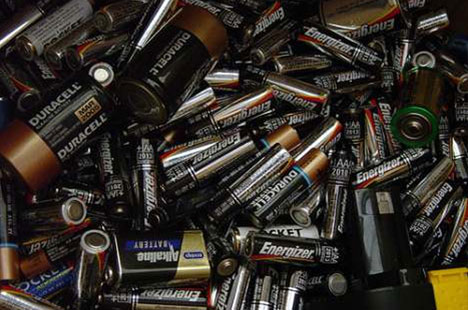
It’s tempting to buy cheap batteries for your wireless microphones. After all, why spend extra money on something that you’re just going to use for a day and throw out? I can’t tell you how many times I’ve sent someone on a battery run, specifying a particular brand, and that person came back with a whole bunch of lesser batteries because they cost less. I feel bad sending them back to the store to get the right ones, but it turns out not all batteries are created equal.
Most stores typically carry Duracell, Energizer, and Eveready batteries, but they may have other brands too. Battery composition (the materials in the battery that store the power) matters more than brand.
Zinc-Carbon
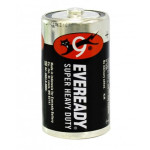 Eveready batteries (just think “Neveready”) are zinc-carbon, which was the first commercial battery composition. They don’t last as long as other formulations, and they tend to self-discharge while sitting on the shelf. Even a brand-new zinc-carbon battery probably isn’t fully charged. Batteries that say “general purpose”, “heavy duty”, or cost $1 for a big bucket of them are probably some form of zinc-carbon or zinc-chloride and you should stay away.
Eveready batteries (just think “Neveready”) are zinc-carbon, which was the first commercial battery composition. They don’t last as long as other formulations, and they tend to self-discharge while sitting on the shelf. Even a brand-new zinc-carbon battery probably isn’t fully charged. Batteries that say “general purpose”, “heavy duty”, or cost $1 for a big bucket of them are probably some form of zinc-carbon or zinc-chloride and you should stay away.
Alkaline
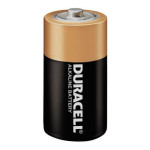 Standard Duracells and Energizers are alkaline batteries. This is a much newer composition, and they tend to last quite a bit longer than their zinc-carbon brothers (typically at least 4x). They are also way better at holding their charge while sitting on the shelf. These are the ones to get if you are using disposable batteries in your wireless microphones. As far as which brand to get, alkaline batteries are all fairly similar, so get what’s on sale.
Standard Duracells and Energizers are alkaline batteries. This is a much newer composition, and they tend to last quite a bit longer than their zinc-carbon brothers (typically at least 4x). They are also way better at holding their charge while sitting on the shelf. These are the ones to get if you are using disposable batteries in your wireless microphones. As far as which brand to get, alkaline batteries are all fairly similar, so get what’s on sale.
What about “professional” batteries?
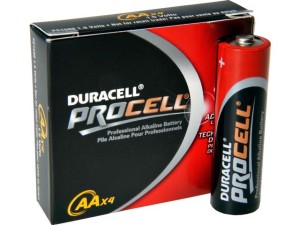 Duracell has their ProCell line, and Energizer has their Energizer Industrial batteries. It turns out they’re pretty much the same batteries as their standard alkalines, but with different labeling. They do have their advantages, though. They are bulk-packed in easy-to-open boxes, so you don’t have to fumble around with opening blister packs during a show. Because they’re sold in bulk, sometimes you can get them cheaper than the regular consumer versions. They are sold only through certain dealers, so there’s less chance that the batteries have been sitting on the shelf for a long time (super-fresh!) If you can find a good deal on these, then they are a good choice. They will probably perform about the same as regular alkalines, however.
Duracell has their ProCell line, and Energizer has their Energizer Industrial batteries. It turns out they’re pretty much the same batteries as their standard alkalines, but with different labeling. They do have their advantages, though. They are bulk-packed in easy-to-open boxes, so you don’t have to fumble around with opening blister packs during a show. Because they’re sold in bulk, sometimes you can get them cheaper than the regular consumer versions. They are sold only through certain dealers, so there’s less chance that the batteries have been sitting on the shelf for a long time (super-fresh!) If you can find a good deal on these, then they are a good choice. They will probably perform about the same as regular alkalines, however.
How about high-drain alkaline batteries?
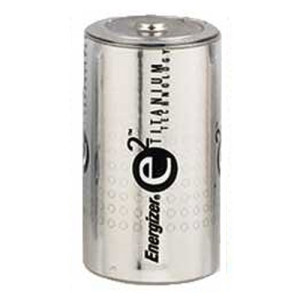 Alkaline batteries have enough internal resistance that they can only spit out energy so fast. This is fine for many devices, as they don’t draw very much current. Other devices, like camera flashes and really bright flashlights, draw lots of current. Some manufacturers offer high-drain versions of their batteries (Duracell Ultra Power, Energizer E2 Titanium), which basically means they can provide greater current if they need to. Most wireless microphones don’t draw enough current to require high-drain batteries. They do last a little longer, but not enough to justify the added cost.
Alkaline batteries have enough internal resistance that they can only spit out energy so fast. This is fine for many devices, as they don’t draw very much current. Other devices, like camera flashes and really bright flashlights, draw lots of current. Some manufacturers offer high-drain versions of their batteries (Duracell Ultra Power, Energizer E2 Titanium), which basically means they can provide greater current if they need to. Most wireless microphones don’t draw enough current to require high-drain batteries. They do last a little longer, but not enough to justify the added cost.
What about Lithium batteries?
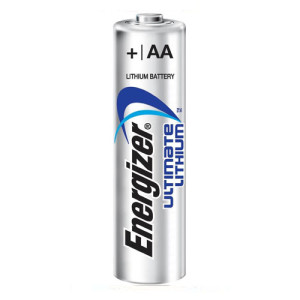 Lithium batteries have a different composition than the alkaline ones. They are excellent for high-drain devices. For a lower-drain device like a wireless microphone, they will last longer, but the improvement over standard alkaline isn’t great enough to make up for the large price difference.
Lithium batteries have a different composition than the alkaline ones. They are excellent for high-drain devices. For a lower-drain device like a wireless microphone, they will last longer, but the improvement over standard alkaline isn’t great enough to make up for the large price difference.
One situation in which you may want to consider lithiums for your mics is when you are using them in a cold environment. Lithium batteries tend to perform better than alkalines at lower temperatures.
There are lots of batteries to choose from when you go to the store. It pays to buy decent ones, but it’s not necessary to get the super expensive ones. I typically get two shows out of a fresh set of standard alkaline batteries with the mics I use, but don’t always make it through a single performance with zinc-carbon batteries (I’m never using those again!).
